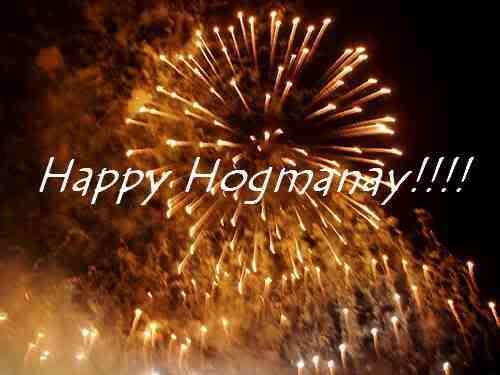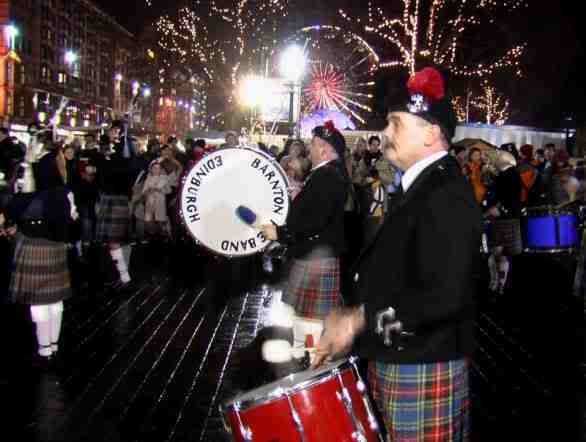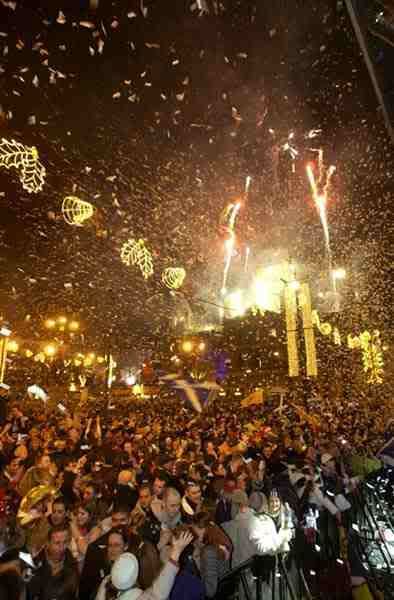Lang may yer lum reek
(Lang may yer lum reek is a traditional Scottish greeting for long life and prosperity and means long may your chimney smoke)

As the masters of the New Year celebration, I thought I would share some of the traditions and words we use at Hogmanay. (sorry it's so long)
One of the main reasons that Scots have always celebrated Hogmanay and New Year is that Christmas was not celebrated as a festival and virtually banned in Scotland for around 400 years, from the end of the 17th century to the 1950s. The reason for this dates back to the years of Protestant Reformation, when the straight-laced Kirk proclaimed Christmas as a Popish or Catholic feast, and as such needed banning.
And so it was, right up until the 1950s that many Scots worked over Christmas and celebrated their winter solstice holiday at New Year when family and friends would gather for a party and to exchange presents which came to be known as hogmanays.
During the day of Hogmanay, the household was cleaned top to bottom so the New Year could be welcomed into a tidy home. Fireplaces were swept out after the very last fire and the ashes read to see what the future would hold.
Brass and silver were polished until they glittered and fresh linen was put on the beds. No routine work was left unfinished: stockings were darned, tears mended, clocks wound up, musical instruments tuned, and pictures straightened. All outstanding debts were paid, overdue letters written and borrowed books returned.
Branches from the rowan tree were placed above the front door to bring good luck, and a sprig of mistletoe was hung in the house to prevent illness. Decorations of holly, hazel and yew were also hung about to ward off mischievous faeries. Juniper was burnt throughout the house, then all the doors were opened to let in fresh air. Now the house was ready for the New Year.
Cupboards and larder were stocked and and money was placed in every wallet in the place to guarantee a prosperous year. And most important, there was plenty of good food to eat. Plum puddings and currant buns were baked, and the kitchen was stocked with spices, cordials, apples, toffee and imported citris fruits. No matter how rich or poor the household, tables were heaped high with festive fare. Hogmanay essentials included "cakes and kebbuck" (oatcakes and cheese), shortbread and black bun or currant loaf and last, but not least by far, uisge beatha which means 'water of life' in Gaelic but is better known as whisky!!
Families brought in the New Year at home, with music, dancing and conversation. The members of the household sat round the hearth and as the evening wore on, the fire was stoked - the brighter the fire, the better the luck.
When the hands of the clock approached midnight, the head of the house rose, went to the front door and held it wide open until the last stroke of midnight to let the Old Year out and the New Year in. Then he closed it quietly and returned to his seat in the family circle. Next, greetings and small gifts were exchanged, glasses were filled and men and women kissed at midnight to ensure that affections and ties remained intact for the next twelve months. It was believed that those who did not do this had a cold, lonely year ahead of them.
Finally, the moment everyone was waiting for: the arrival of the First Footer. It was - and still is - thought to be good luck if a tall, dark, handsome stranger bearing certain gifts - and preferably wearing a kilt - was first to cross the threshold on the stroke of midnight. This was called First Footing, a custom still practiced in Scotland.
Until recently, there were strict rules on the appearance of the First Footer. He should not have light hair, flat feet, crossed or squinty eyes, or espcially eyebrows that met in the middle, as this was associated with the Evil Eye. Women and those with disabilities were also feared. Exceptions to this rule were new brides, new mothers, or anyone born on January 1st, who were also thought to bring good luck.
The First Footer came bearing tokens of good luck: a lump of coal (in earlier days, tinder) for the hearth, a loaf of bread (or shortbread or fruit cake) for the table and a handful of salt for prosperity. He always knocked on the door before crossing the threshold. On entering the front door unhindered, he placed the fuel on the fire and the food on the table and poured a dram of whisky for the head of the household, all without speaking, or being spoken to, until he wished everyone "a merry New Year." Or, in some areas of Scotland, he said, "Lang may your lum reek" (Long may your chimney smoke), an invocation to keep the hearth fire burning.
When the ritual was over and the First Footer had his fill of food and drink, he left by the back door and headed for the next house on his route, a little warmer and merrier than before he arrived.

It was also a tradition for first footers and guests to recite a 'Duan Challuinn ' or Hogmanay poem, although in later years this was expanded to all guests performing a song or a poem or some other entertainment.
Here is one such example of a traditional poem;
Great good luck to the house,
Good luck to the family,
Good luck to every rafter in it,
And to every worldly thing in it.
Good luck to horses and cattle,
Good luck to the sheep,
Good luck to everything,
And good luck to all your means.
Luck to the good-wife,
Good luck to the children,
Good luck to every friend,
Great fortune and health to all.
And on leaving, the guest would say a traditional Scottish blessing over his shoulder;
The Sacred Three
To save,
To shield,
To surround
The Hearth,
The House,
The Household,
This eve,
This night,
Oh! this eve,
This night,
And every night,
Each single night.

And of course, no New Year would be complete without a rendition of Rabbie Burns' 'Auld lang syne' so here are both the original Burns lyrics and the English version...
Auld Lang Syne
Chorus.
And for auld lang syne, my jo,
For auld lang syne,
We'll tak a cup o' kindness yet,
For auld lang syne,
1.
Should auld acquaintance be forgot,
And never brought to mind?
Should auld acquaintance be forgot,
And days o' auld lang syne.
2.
And surely ye'll be your pint-stowp!
And surely I'll be mine!
And we'll tak a cup o' kindness yet,
For auld lang syne.
3.
We twa hae run about the braes
And pu'd the gowans fine;
But we've wander'd mony a weary foot
Sin auld lang syne.
4.
We twa hae paidl'd i' the burn,
Frae mornin' sun till dine;
But seas between us braid hae roar'd
Sin auld lang syne.
5.
And there's a hand, my trusty fiere!
And gie's a hand o' thine!
And we'll tak a right guid willy waught,
For auld lang syne.
English version;
Old Long Past
Chorus.
And for old long past, my joy (sweetheart),
For old long past,
We will take a cup of kindness yet,
For old long past,
Should old acquaintance be forgot,
And never brought to mind?
Should old acquaintance be forgot,
And days of old long past.
And surely you will pay for your pint-vessel!
And surely I will pay for mine!
And we will take a cup of kindness yet,
For old long past.
We two have run about the hillsides
And pulled the wild daisies fine;
But we have wandered many a weary foot
Since old long past.
We two have paddled in the stream,
From morning sun till noon;
But seas between us broad have roared
Since old long past.
And there is a hand, my trusty friend!
And give me a hand of yours!
And we will take a right good-will drink,
For old long past.
(with grateful thanks to world burns club, historic-uk, widdershins and other sources for beefing out the material)
So, to all my fellow TFers, may 2009 see all your dreams come true, your health to be the best it can be. May you and your loved ones be blessed with more smiles than tears and may the world be a slightly more peaceful place than 2008. Let's hope that more conflicts are resolved than started and that we can all find some measure of happiness in the coming year!!!
(right, stopping there before a bloody tear appears in my eye)



0 Comments
Recommended Comments
Please sign in to comment
You will be able to leave a comment after signing in
Sign In Now